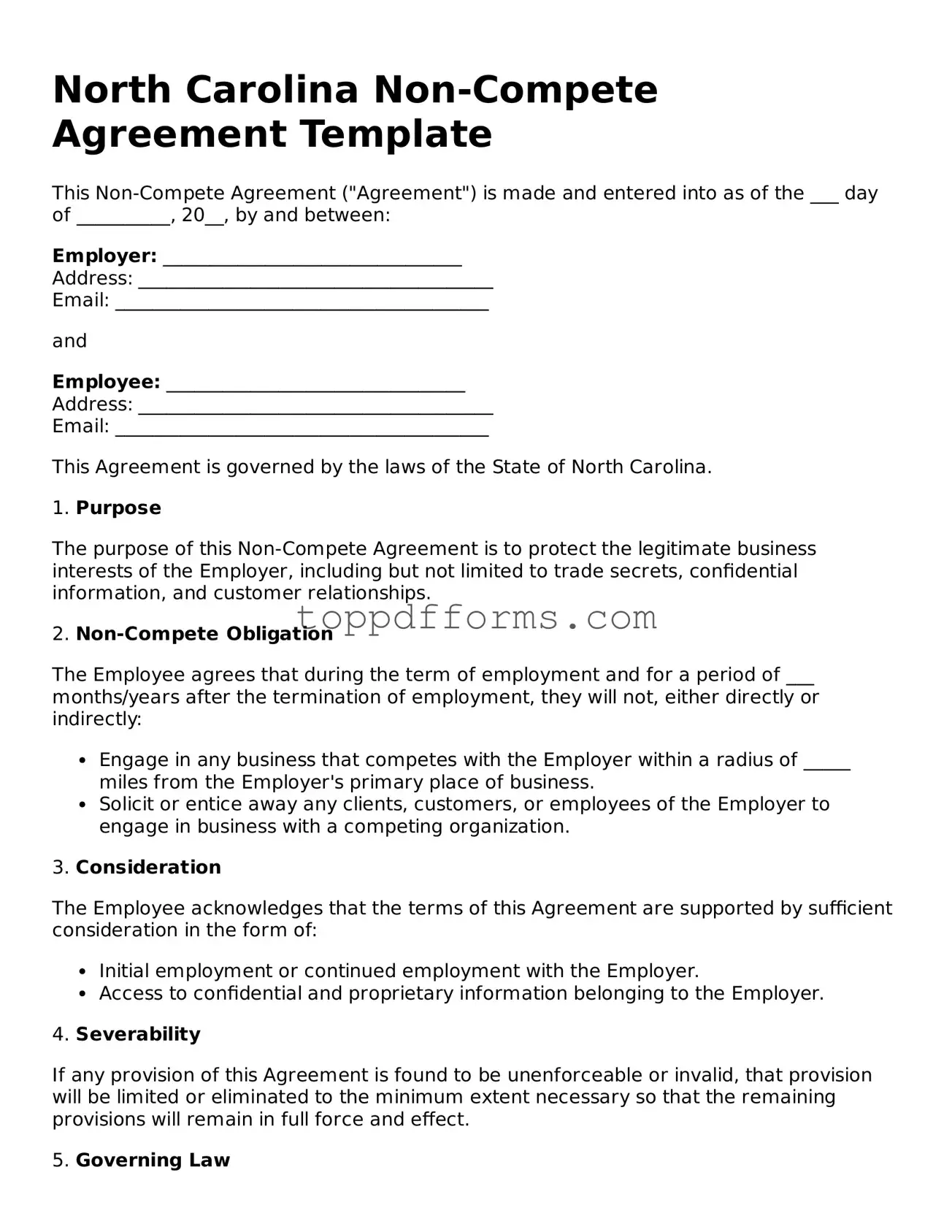Non-compete Agreement Document for North Carolina State
Things You Should Know About This Form
What is a Non-compete Agreement in North Carolina?
A Non-compete Agreement is a legal contract between an employer and an employee. It restricts the employee from engaging in business activities that compete with the employer's business after leaving the company. In North Carolina, such agreements must be reasonable in scope, duration, and geographic area to be enforceable.
Are Non-compete Agreements enforceable in North Carolina?
Yes, Non-compete Agreements can be enforceable in North Carolina, but they must meet specific criteria. They should protect legitimate business interests, such as trade secrets or customer relationships. Additionally, the terms must be reasonable, meaning they should not impose undue hardship on the employee or be overly broad.
How long can a Non-compete Agreement last in North Carolina?
The duration of a Non-compete Agreement in North Carolina varies based on the nature of the business and the role of the employee. Generally, courts have found that a duration of six months to two years is reasonable. However, longer periods may be acceptable if justified by the circumstances.
What geographical area can a Non-compete Agreement cover?
The geographical scope of a Non-compete Agreement must also be reasonable. It should be limited to areas where the employer conducts business or where the employee worked. Overly broad geographical restrictions may lead to the agreement being deemed unenforceable.
Can I negotiate the terms of a Non-compete Agreement?
Yes, employees have the right to negotiate the terms of a Non-compete Agreement before signing. It is advisable to discuss any concerns with the employer and seek modifications to ensure that the terms are fair and reasonable. Open communication can lead to a more favorable agreement for both parties.
What happens if I breach a Non-compete Agreement?
If an employee breaches a Non-compete Agreement, the employer may seek legal remedies, which could include injunctive relief to prevent the employee from working for a competitor and potentially monetary damages. The consequences depend on the specific terms of the agreement and the circumstances surrounding the breach.
Should I consult a lawyer before signing a Non-compete Agreement?
It is highly recommended to consult with a lawyer before signing a Non-compete Agreement. A legal professional can help clarify the terms, assess the agreement's fairness, and provide guidance on potential implications for your career. This step can help protect your rights and future opportunities.
PDF Overview
| Fact Name | Description |
|---|---|
| Governing Law | Non-compete agreements in North Carolina are governed by state law, specifically under N.C. Gen. Stat. § 75-4. |
| Enforceability | These agreements are enforceable only if they are reasonable in duration, geographic area, and scope of activity. |
| Duration | A typical duration for a non-compete agreement in North Carolina ranges from six months to two years, depending on the circumstances. |
| Geographic Scope | The geographic area must be clearly defined and should relate to the area where the employee worked. |
| Consideration | For a non-compete agreement to be valid, there must be adequate consideration, such as a job offer or promotion. |
| Employee Rights | Employees have the right to negotiate the terms of a non-compete agreement before signing. |
| Judicial Review | Courts in North Carolina will review non-compete agreements to ensure they are not overly restrictive. |
| Exceptions | Certain professions, such as medical practitioners, may have specific regulations regarding non-compete agreements. |
Common mistakes
Filling out the North Carolina Non-compete Agreement form can be a straightforward process, but many individuals make common mistakes that can lead to issues down the line. One frequent error is failing to clearly define the scope of the agreement. The agreement should specify what activities are restricted, but vague language can create confusion. A lack of clarity may result in disputes about what is considered competition.
Another common mistake is overlooking the duration of the non-compete clause. Many people either set the time period too long or too short. A reasonable duration is essential for enforceability. If the period is excessively lengthy, a court may deem it unreasonable. Conversely, a duration that is too short may not adequately protect the interests of the employer.
People often neglect to consider the geographic scope of the agreement. The non-compete should specify the areas where the restrictions apply. If this is not addressed, it could lead to enforcement challenges. An overly broad geographic scope can also be deemed unenforceable, so it’s crucial to strike a balance that reflects the business's needs.
Another mistake involves failing to include consideration. In legal terms, consideration refers to something of value exchanged between the parties. If the agreement lacks this element, it may not hold up in court. It’s important to ensure that both parties receive something in return for signing the agreement, whether it’s employment, training, or access to proprietary information.
Lastly, individuals sometimes forget to review the entire document for accuracy before signing. Typos or incorrect information can undermine the validity of the agreement. Taking the time to carefully read through the form can prevent misunderstandings and legal complications later. Ensuring all details are correct helps to create a solid foundation for the agreement.
Other Common State-specific Non-compete Agreement Forms
Staffing Agency Non-compete Agreement - Non-compete Agreements can also include non-solicitation clauses, which restrict former employees from enticing clients or other employees to leave.
The Florida Divorce Settlement Agreement form is a crucial legal document that outlines the division of assets, debts, and responsibilities between parties in a divorce. This form is integral to the divorce process in Florida, ensuring that all terms of the divorce are clear and legally binding. For those looking to access the form, it can be found at floridaformspdf.com/printable-divorce-settlement-agreement-form/, which helps minimize misunderstandings and ensures an equitable distribution of property and responsibilities.
Pennsylvania Non-compete Laws - Each party may benefit from consulting legal advice before signing the Non-compete Agreement.
